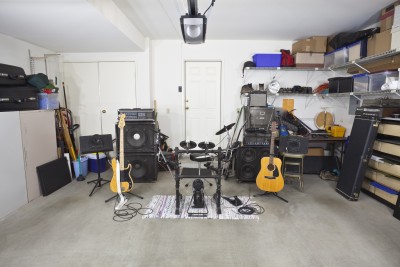Over the years, I have gathered some ideas about rehearsal etiquette. I know I have messed some of these up, especially as a young, excitable musician. These ideas apply to every style of music, from orchestra to rock bands. (I have done both) Some of these might seem obvious, but believe me, there are musicians out there pulling all of these stunts.
Just my opinion, as usual…
Things not to do:
1. Avoid the deliberately apathetic attitude I see in some circles. You might think you appear “seasoned” to your cohorts by cultivating a disinterested and jaded vibe, but it won’t impress your employer, and they are the ones paying you. Plus it’s just plain unprofessional.
2. Along these lines, don’t be late! There are some musicians that deliberately show up late to show how cool and nonchalant they are. I’m not going to hire you, nor will anyone who cares about getting things done.
3. Don’t take phone calls and spend a lot of time with texting and email. Same goes for miscellaneous internet/social media stuff.
4. When you make an error, finding a trivial flaw in the chart will not fool anyone.
5. Avoid gossiping and critical talk about other musicians; this makes you look insecure and lowers the dignity of the situation.
6. Try not to be too robotic and literal about charts and material; if something doesn’t match the charts, adapt to it without a lot of fuss. Often things will change, and saying, “that’s not how it’s written” will make you seem inflexible and rigid. If the music has changed, take note of it and move on.
7. Try not to correct the other musicians unless necessary; the leader can handle this. Focus on your own part. Being helpful is different.
8. Unless arrangements have been made, don’t leave early. This is your gig, and it needs your full attention.
9. Try not to ask for constant approval and reassurance from your employer; unless you hear otherwise, assume everything is OK.
10. Avoid getting into the politics of the situation. Many musicians have lost gigs by getting into the middle of things like other people’s pay, gig arrangements, etc. This needs to be discussed privately, not at rehearsal.
11. Don’t “vibe” anybody or act superior. There are plenty of people looking for gigs, and you are not indispensable. I can’t tell you how many rehearsals I have had to endure with musicians who won’t give the time of day to anyone around them. Unless you are a big star, this won’t work out well.
12. Avoid “showing off” and overplaying. Again, only other players of your instrument would care, and they don’t usually hire you.
13. Don’t noodle and make noises between songs and while things are being discussed. If you can turn down your volume and practice, this is OK, but if you play loudly, it will become an annoyance.
14. Don’t get into a contest to see who is cueing intros, endings, etc. This can make you seem pushy and controlling. Usually there is someone in charge of this.
Things to do:
1. BE PREPARED! Again, there are “uber-cool” musicians that think being unprepared and late makes them seem important. The implication is that they are so busy that they don’t have time to prepare. Or worse yet, they feel like homework is “unpaid” and isn’t part of the gig. This is small-time posturing, and only impresses fellow “b-teamers.” The real pros show up polished and ready to perform.
2. Be positive and pleasant. This is a professional situation; check all your problems at the door, and devote your full attention to the gig. You will get more work by being laid-back and friendly.
3. Have all your stuff set up for the downbeat. If you are a drummer or keyboard player, this means showing up earlier so you are not scrambling to get ready. We all know that singers and others don’t have the same setup needs… That’s just how it goes.
4. Have a pencil and a music stand light in your gig bag.
5. Get a metronome app for your smartphone, especially a silent, flashing one. Take note of tempos if you are in charge of counting. However, don’t try to correct the leader if they are off the written tempo; just “go with it.”
6. Write things down on the chart or in your notes. You will likely forget them if you don’t. This attention to detail will make life easier for you and the group.
7. Play the part that fits, and leave space. Filling in every possible space with fills will become annoying. Accompany the featured element or soloist. You are not here to impress your fellow musicians.
8. Be helpful, but avoid constant suggestions and opinions; this becomes a disruption. You are part of a team.
9. If there is a tricky part, it is OK to occasionally say “give me a second to look this over.” or “let’s run this part one more time for me.” This doesn’t need to be constant, but once in a while shows a desire to get it right. Doing this a lot might also show ill-preparedness, so be reasonable with this.
10. If someone is difficult or is “vibing” everyone, I suggest acting as if you didn’t even notice. This will keep you from getting involved in those sort of games, and you will “rise above” petty and rude behavior.
11. Ask questions, but avoid being “helpless.” try to figure out what is going on quietly before asking for help.
12. Play at an appropriate volume. There is such a thing as “rehearsal volume.” sometimes at a full run-through, you can crank up, but when learning and discussing the music, avoid blasting. And, by all means don’t get offended if asked to turn down(!)
Enjoy yourself
Rehearsing can be fun, and when everyone takes a positive, can-do attitude, it can be a breeze. Do you have any rehearsal tips? Ever have a rehearsal go wrong? Did you make any “rookie” errors? (I sure did!)



Pingback: Working With Difficult People | Randy Hoexter()